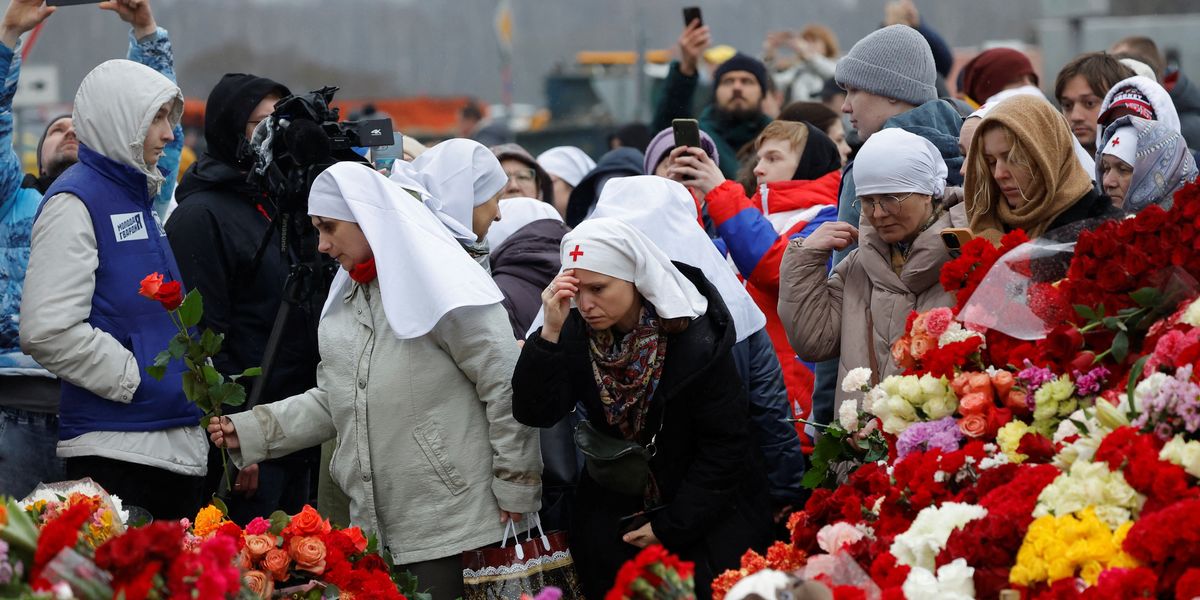The Islamic State terrorist attack in Moscow is the starkest possible reminder that despite the war in Ukraine, Russia and the West also still have some of the same enemies.
What the terrorists — ISIS-K, an Afghanistan offshoot of IS, took responsibility — did in Moscow, they have done in Paris and Manchester — and will do (and did do, on 9/11) in New York and Washington, if they get the chance.
This horror is also a reminder of the fatal results of mutual distrust. It appears that U.S. intelligence warned the Russian government of an impending attack — and President Putin dismissed this as a U.S. “provocation.” In the event that Russian intelligence were to warn the U.S. of a coming terrorist attack, it is only too easy to imagine Washington reacting in the same way.
Moreover, the attack should make us think about the degree to which governments and security elites around the world are liable to lose sight of the real interests and safety of their fellow citizens — which it is their first duty to defend. In their obsessive focus on the supposed threat from each other, both the Russian and the U.S. establishments have forgotten this duty.
Over the past three decades, Washington has certainly threatened important interests in Moscow, and Russia’s international status as a great power. But (at least until Putin’s invasion of Ukraine and the U.S. provision of arms and intelligence to Ukraine), Washington never killed a single Russian citizen.
As to the idea of a direct American and NATO attack on Russia (as alleged in Russian domestic propaganda) this was always absurd. No such plan ever existed. And in any case, if Russia is really so vulnerable, what is its nuclear deterrent for? Meanwhile, over this period, Islamist terrorists have killed hundreds of Russian citizens, at Vladikavkaz in 1999, 2008, and 2010; the Dubrovka theater in Moscow in 2002, the Beslan school in 2004, and now again in Moscow.
Russia for its part has (to a much lesser extent) threatened American international interests and aspects of its global primacy, but Russia has never posed a threat to the U.S. homeland or the lives of ordinary Americans. Russia has never had the ability or (at least until the Ukraine War) the desire to do this; and in any case, what is the U.S. nuclear deterrent good for, if not to deter such a threat?
As to the idea of a Russian invasion of NATO, this is half Cold War paranoid fantasy, half domestic propagandist lie designed to boost Western military budgets. Meanwhile, over the same period, Islamist terrorists killed thousands of ordinary American citizens on 9/11, tried to do so in Boston, and have every intention of doing so again if they can; and killed hundreds of people in U.S. allies in Europe.
This confusion of priorities has also profoundly affected U.S. policy and U.S. media analysis in the Middle East. Russian analysts of my acquaintance simply could not understand how after causing disasters in Iraq and Libya, the U.S. and its allies could have desired to overthrow the Baath state in Syria, and ensure chaos and a very likely victory for IS (as indeed the CIA warned President Obama).
Russians asked how, in early 2011, Secretary of State Hillary Clinton can have urged continued support for the brutal dictatorship of Hosni Mubarak in Egypt — on the grounds that otherwise Islamist extremists might triumph — and then later that year described Russian support for the brutal dictatorship of Bashar al Assad as “despicable,” though it took place for exactly the same reasons. The only explanation they could find was that much of the U.S. establishment was possessed by a pathological hatred for Russia — and they were not wholly wrong about that.
Before and during the second Chechen War beginning in 1999, motivated by blind hostility to Russia, many Western commentators tied themselves in knots trying to avoid acknowledging the growing role of Islamist extremists in Chechnya, and to avoid describing their actions as terrorism. Today, although IS has publicly claimed responsibility for the attack in Moscow, President Putin is seeking to blame it on Ukraine.
Unless he can provide real evidence for it, the Russian elites should reject this charge. Otherwise, once again, they will be failing to defend their fellow citizens against the real threats facing them. Similarly, it is to be hoped that no Western analyst will pay attention to the Ukrainian suggestion — with no evidence at all — that this disaster for Russia was the work of the Russian authorities themselves.
Finally, there is the issue of responsibility. It is absolutely unconscionable that after the U.S. warning, and the example of the dreadful terrorist attack on a Moscow theater in 2002, the Crocus hall was left unguarded. This was criminal negligence on the part of the Russian authorities, and we must hope that senior officials will resign in shame or be severely punished.
But if recent history is any guide, we will hope in vain, as we have hoped in vain that U.S. politicians and officials would take personal responsibility for the disasters into which they have led America over the past generation. This is partly a matter of laws and institutions capable of holding elites to account — things that never existed in Russia and are decaying fast in the West.
Much more importantly, it is a question of inner conscience and a sense of duty. We like to think we are better than Russians in this regard. I wouldn’t be too sure about that.















